HOME


The soul is entombed in the Flesh, and seeks at-one-ment with it's origin, the cosmos.
The core of the aeons-old stories known as the ‘mysteries’lay below and are revealed. The real meaning behind Christmas,the real meaning behind Easter, and the real meaning behind the religions particularly for those of you who are taking graduate courses in historical and religious studies!
Before you go any further, just know that everything you’ve been told has been a lie. Fortunately some of us are smart enough to recognise these lies for what they are but can’t diagnose the lie nor get to the heart of why it’s a lie. This is the knowledge which is nothing new it’s been known for as long as anyone can remember, but it’s knowledge that has been sequestered from you by a very select few.
This is not a condemnation on spirituality or faith. This is an expose on a certain dogmatic system that has been put before you as spirituality and faith.
The next logical question would be why, and by whom?

THE LOST MEANING OF DEATH
by Alvin Boyd Kuhn,
"For I have heard from one of the wise that we are now dead; and that the body is our sepulchre." PLATO.
"The command that meant life proved death to me."
ST. PAUL.
"You have the name of being alive, but you are dead."
REVELATION III, 1.
In presenting to the public the thesis of this particular address the speaker is overawed by a twofold realization. He is aware, first, that the interpretation of all ancient Holy Writ which he here offers will be disruptive of the established creedal religions of the Western world.
And, in the second place he knows that the presentment will fall with such astonishing force upon Occidental religious thought as to seem incredible in spite of an array of positive testimony certifying its correctness. He may well be pardoned a feeling of hesitation and dubiety in making the revelation, for it has involved him in a daring incursion into interpretative terrain whither no scholar has penetrated before him.
From the penetralia of that little-trodden domain of ancient religion-mystery he brings forth into modern light a discovery that will severely tax all the resources of common acceptance.
Traditional norms of thought do not readily relax their grip on the general mind. It is scarcely to be hoped that an announcement so subversive of accepted ideas in religion and theology will be received without scepticism or resentment, since it invades a field in which conservatism is most stolidly rooted.
Traditions long institutionalized do not easily bend to correction of principles basically vital to their very existence. Yet truth demands insistently from her devotees her inexorable tribute of sincerity and courage, and scholarship must flinch no duty in the line of truth-seeking.
It will be impossible in a brief preview to do more than hint at the sweeping force of the disclosure now to be made in the domain of religious interpretation. It is permissible to assert that it will revolutionize the entire modus of such interpretation in vogue since the third century of the Christian era.
Not alone one or two, but all of the doctrines of Christian theology will have to suffer drastic revision and restatement in the light of the import of this announcement.
For in olden times the proper signification of the terms "death" and "the dead" was the touchstone by which the meaning of all scriptural writing could be gauged. The terms carried in their ancient usage a hidden or esoteric connotation, which was at once a clue to the primary meaning of the entire structure of theology and a key to the rational envisagement of our mortal life.
The sagacious ancients were content to let a secondary implication of the terms, more readily apparent on the surface, prevail in the exoteric understanding, while imparting to the Mystery Initiates an occult signification which bore the real purport of Scripture, infinitely more informing and dynamic.
We are reliably informed that the sages of old employed mythical and cabalistic devices at once to reveal and conceal a profounder meaning in their sacred writings, using at times "blinds" to suggest to the untutored a shallow rendering, while conveying to those versed in symbolical methodology a far profounder message. The most startling of these ruses was their use of "death".
Teaching for the living was put out under the guise of instruction for "the dead". Great moral and spiritual systems were cloaked under the mask of "Books of the Dead," as in Egypt and Tibet.
This being so, the sequel will show why a revision of our understanding of what was implied by the archaic use of the terms will so radically transform the meaning of every single doctrine of the Christian faith. For the key to the correct interpretation of all Scripture is just this ancient theological connotation of the word "death".
What, we may surmise, must have been the consequences to theology and to world history of the loss of this arcane clue as far back as the third century! In imagination we can roughly begin to depict the prodigious handicap under which the theologians have labored for sixteen centuries.
The depth of the darkness that has involved the whole region of religious intellectualism can be sensed without difficulty. It will hardly be a matter of surprise if we discover that every single dogma of Christian systematism has been sadly distorted out of its original sense. The discerning student is now able to trace the dire disfigurement of every Christian doctrine.
For as the liniaments of ancient beauty become outlined again beneath the distortions of mediaeval and modern crudity, he is then for the first time made aware of the unconscionable grossness of rendering to which pure spiritual formulae of the arcane science have been subjected.
He sees that Christian doctrinal material was interpreted in blind ignorance of a former recondite wisdom and that mass psychology has been made for ages the hapless slave to the crudest of misconceptions.
For, it seems, not a scholar, not a theologian, mediaeval or modern, has been aware of the masked meaning of the word "death", or suspected that it cloaked a cryptic signification, the discernment of which would have necessitated a reconditioned statement of every teaching or exegesis.
Now, a clear inspection of Greek and Egyptian systems brings the lost clue to light, with what consequences to modern thought as a whole the mind is staggered to envision. In the flash of vivid light engendered by the revelation one can again survey the beautiful field of ancient spiritual truth, long buried under mists of ignorance.
With one glance it can be seen that the entire structure of theological science can have sane and pertinent interpretation only by the application to it of the magical key that has been so long lost.
Equally clear comes the perception that is has been the want of this key that has reduced religion to a meaningless babble of piety and sentimentalism, degrading the once kingly science of theology at the same time to the status of an outcast from the seats of modern intelligence.
With startling force, too, it can be felt that the rediscovery may be timely enough to redeem the precarious fortunes of religion and theology from the danger of total eradication in a world that is fast growing less hospitable to them.
Religion has been fighting a losing battle in modern life, and one of the basic reasons now comes glaringly to light. Indeed it becomes readily apparent that unless religion sets itself industriously to repair the breach made in its structure by the loss of keystone elements, it may not be able to withstand the assault of radical bitterness.
Christianity, as a system of exclusive sacred truth or a unique revelation of divine wisdom, is already reeling under the impact of one blow after another dealt it by the study of Comparative Religion and Comparative Mythology.
The "deadly parallels" found to run so consistently and so strikingly between the life of the Gospel Jesus and the legends of some twenty or more antecedent Christly figures or Sun-gods, in the role of world-saviors, are rapidly piling up the evidence that tends to jeopardize the validity of the entire body of Gospel narrative as history.
It is beginning to dawn on intelligent and informed students that the New Testament Gospels are not the biography of any "person" or living character at all, but are old dramatic books of the religious Brotherhoods, portraying, not the "life" of any man, but only the spiritual history of a typical figure.
All previous Messianic characters, or Sun-gods, were only such typal dramatizations of man’s inner life, under the form of a representative "history".
The Christs were simply ideal figures held up before men to provide them with an inspiring picture of their own attainable perfection. Unbelievable as it may appear, it is the fact of history that with the lapse of time and the decay of philosophical culture, the more ignorant came to take these dramatic heroes for actually living persons.

And a designing priestcraft, either itself now sunken in similar ignorance, or motivated by piety or knavery, or both, found it advantageous to the interests of a worldly ecclesiastical system to connive at the misunderstanding.
At any rate, the Gospels, which were only spiritual allegories (see the writings of Philo, Clement and Origen, and note Paul’s statement that the story of Abraham, Sarah and Hagar "is an allegory"), were about the third century converted into literal history.
And it was at this juncture that the ancient meaning of the term "death" passed out of the ken of even the most learned of the leaders of Christianity, and with it fled all possibility of retaining or regaining the deep inner sense of the scheme of theology.
The appeal of early Christianity to the ignorant masses, and the popularization of its tenets, which were originally drawn from the esoteric schools and Mysteries (see any good text on Christian origins), quickly led to the obscuration of all but the most literal sense of scriptural material.
Christianity smothered out the ancient Wisdom-Religion or Gnosis, and by garbling the interpretation of purely spiritual teachings, wrecked the machinery of the arcane science.
The main shift of the wrecked cabalistic mechanism was the cryptic connotation of "death". Its restoration at this time will go far to reconstruct the venerable enginery of spiritual wisdom. It may force Christianity to admit its pagan sources, and thereby pave the way for a return to the primal purity and sublimity it boasted when it first issued from lofty pagan springs.
It will tend to bring Christianity humbly knocking at the doors of the ancient pagan temples, which misguided zeal closed in the fifth century. For the Ancient or Ageless Wisdom, taught in the arcane schools of old, has had a modern rebirth, and Christianity will find its salvation from almost universal distrust by recognizing in the occult movement the spirit of its original motivation.
But certainly many will have come here this evening challenging in their minds the legitimacy of the wording of the title of the address. How, you are saying, can death ever have had a meaning other than its common one, and how could that ever have been "lost"?
Before meeting your natural scepticism on this point with its proper and adequate answer, perhaps the question may best be countered by putting forth some other questions that may never have occurred to you. How was it that the doctrine of the judgment lost its original meaning? How came the doctrines of hell and purgatory likewise to lose their first connotations?
How did it occur, further, that the meaning of such events as the baptism, the circumcision, the temptation, the transfiguration, the crucifixion, resurrection and ascension has in the same way been lost or corrupted? How indeed did the very birth of Jesus, his sudden burst of sage wisdom at the age of twelve, his bloody sweat in the garden, his triumphant entry into Jerusalem, his trial and mockery, all likewise drift far away from what they were taken to mean at the start?
How did all the miracles, all the parables, the whole outline, in fact, of Biblical wisdom, suffer the loss of a primal interpretation and sink into the veriest travesty or caricature of their true sense that humanity has ever been asked to "believe"?
For it can now be stated without fear of contradiction that not an item of Gospel theology retains the most distant resemblance to that grand meaning which it once held in the minds of the great sages and illuminati. If you will answer these questions you will have a direct answer to your challenge as to the legitimacy of our title.
All these fundamental items of Christian theology have been perverted out of their correct spiritual translation as the result of a momentous historical denouement about which all too little is generally known. At the precise time at which Christianity was being formulated, powerful currents of economic, social and religious forces had come into play, the operation of which precipitated a swift and drastic shifting of the center of gravity, so to say, in religious values and motivations.
From the days of Pythagoras and Plato, when Greece was guided by the inner enlightenment of the great Orphic Mystery teaching, the profound insight of Grecian philosophy had seen life on earth as the critical sphere of destiny. Values were thought to be won and permanent character established, by the deeds done in the body. Earth was the arena of conquest in life’s struggle.
The thing of chief importance was that which was done here in this world. Our mundane acts, words and thoughts stamped the marks of destiny on our souls. But with the loss of the spiritual Gnosis, human reason became unable to cope with the apparent hollowness and futility of worldly experience, and a sense of earthly defeatism and hopelessness seized the general mind.
As all hard-won earthly values were seen to slip away from their possessor at the stealthy approach of age and decrepitude, to be finally snatched away by the hand of death, and it was no longer known how the gains won by strenuous experience were treasured up in man’s interior constitution, a despair of the good of mundane life overwhelmed the consciousness of the age.
Former hearty zest for living gradually gave way to scepticism, cynicism and pessimism. Robust Greek philosophy yielded in a century or two to badly understood forms of Oriental negativism and resignation.
Mortals turned their eyes from earth to the post mortem heaven world as the locale of rewards and compensatory happiness. Gilbert Murray, the Oxford scholar, has designated this transferal of values by his famous phrase, "the loss of nerve" on the part of the Greek world.
The substance, as it were, had been extracted out of earth experience; a fatalistic resignation set in and an earth-weary race fixed its eyes on heaven, the next world, as the place where sublunary wrongs were to be righted and human ills and woes blissfully compensated.
This revolutionary alteration of viewpoint was the outer evidence of an inner loss. Humanity had mislaid the chart of its spiritual destiny, and with it the location of its pole-star of truth and wisdom. It had lost its light of guiding understanding. And with it took flight also the last vestige of the true meaning of the religious data.
Sweeping clear out of the purview of this life altogether, and over into another domain to which it was never intended to minister in the beginning, fled the message of all the Scriptures. Religion had been instituted in the first instance as instruction and guidance for man’s life on earth.
But a false indoctrination following the loss of arcane teaching caused the disastrous shift in the focus of vision and the location of values. So that what had been intended for our perpetual behoof in the life lived here, shot clear over the head of this world and landed in another realm, the astral world of spirits. Religion had become a cult of "otherworldliness," a looking to heaven for fulfilments denied here.
Hence arose the cultus of spiritualism, and indirectly that of asceticism. Only in this light can we understand also the allocation of the idea of "heaven" to a strategic or central place in nearly all religions. For human yearnings demanded a region in which earthly failures were crowned with poetic success.
A necessary consequence of this change, this loss of knowledge, was the transposition also of the continuity of progress for the soul from this life to the life in spirit. If effort was to be held as absolutely fruitless here, then provision had to be made for continued unfoldment in the life out of body.
Not even the roseate heaven could be made rationally satisfactory until this matter of perpetual development was adjusted in line with specious reasoning. But here religion ran into its most egregious error, and originated a chain of untold disaster for human life and effort.
It proved the ruin of all sound religious philosophy and closed off the channel of all religious benefit. It defeated the prime purpose of religion altogether, for it left man bereft of just those incentives which would have inspired him to apply himself with courage, steadiness and fortitude to the tasks for the accomplishment of which he came to live on earth.
For it postulated the thesis that souls, cut off untimely in their growth on earth, would continue to evolve eternally to infinite glories of godhood, in the spiritual spheres. Here was born a delusion that has stultified the spirit of mankind ever since.
For no more can a soul achieve any further cycle of growth out of earthly body than can an acorn become another great oak without being buried in the soil of earth. And this theory that has palsied an infinite amount of human effort came by default of religious knowledge of the hidden sense of the term "death".
Thrown under a mental coma by the alluring force of the belief, short-sighted and blinded faith has never seen that if continued spiritual progress were possible in a discarnate existence after only one brief life on earth, there could be found no warrant either in logic or in cosmic counsels for our projection into this life in the body for the one fleeting career.
The incarnation can never be justified save by the postulation of reincarnation. One life here, thrown in with an eternity of growth in a spirit realm, is an untenable thesis to explain a rational cosmic procedure.
Speaking advisedly, one may still freely assert that the obscuration of the inner meaning of "death" has utterly wrecked the science of theology. It has been the primary wellspring of that total illogicality and natural unseemliness in the scheme of theology which has so widely deprived it of intellectual support in the modern age.
To a somewhat less extent, but still more considerably than has been surmised, it has militated likewise to hold in confusion some elements of the occult interpretation. It seems indeed to have escaped discovery universally, and all spiritual teaching everywhere has suffered in consequence.
The first hints in the direction of the discovery were picked up when in the study of the great system of Greek thought known as Neo-Platonism, with its interpretations of Greek mythology and religion, one became aware of a peculiar handling of the idea of death.
To convey just what is meant by this statement it will be necessary to quote a number of passages from the Greek writers themselves. They are in themselves quite valuable and should be more widely known. The most lucid renditions of Neo-Platonic ideas come to us though the translations of Thomas Taylor. We begin with a comment of Taylor’s own on Greek ideas regarding human life as a kind of death:
"They believed that human souls were confined in the body as in a prison, a condition which they denominated genesis or generation, from which Dionysus would liberate them. This generation, which linked the soul to body, was supposed to be a kind of death to the higher form of life.
Evil is inherent to this condition, the soul dwelling in the body as in a prison or a grave. The earthly life is a dream rather than a reality the soul is purified and separated from the evils of this condition by knowledge" or what they called "philosophy".
MANS TWO BIRTHS

The great Plato is himself found saying that "men are placed in the body as in a prison" and that he considered "the body as the sepulchre of the soul". Taylor in discussing an opinion of Macrobius ascribed to him the conception that "the soul in the present life may be said to die, as far as it is possible for a soul to die; occultly intimating that the death of the soul was nothing more than a profound union with the ruinous bonds of the body."
One noted that the incarnation or entry of the soul into the body was often alluded to as a burial! Then Pythagoras had written that "whatever we see when awake is death". Likewise the great Plotinus had given hints such as the following:
"Death to the soul is to descend into matter and be entirely subjected to it. This is what is meant by falling asleep in Hades."
And the renowned Virgil, the Roman poet, had shown that he was imbued with this same Greek philosophy when he wrote:
"Souls are deadened by earthly forms and members subject to death."
Plato had compared our tenure of bodily forms to the situation of an oyster in its shell. And Socrates had soliloquized in a long passage on the subject of death, asking Cebes if it might not after all be true that we had come hither from a far more radiant life elsewhere, and that we should properly regard the present life as in reality a death.
"May it not be true that we are really dead?" he asks, intimating, like Wordsworth, that we seem at times to have faint glimpses of a more vivid existence from which we have fallen into this dullness of mortal life.
It had been a matter of some surprise, also, to note Milton’s expression of Adam’s astonishment in the Paradise Lost, when on being driven from the garden under condemnation of death, our first father found his sentence taking the form of a lingering existence, not a destruction of his life, as he had expected. He discovered that his "death" meant not his extinction, but a less vivid type of life. He found himself condemned to a "living" death. He was made to live and "suffer death", not to be annihilated.
We must regard such expressions as this of Milton as being remnants of the ancient philosophical tradition, which we find so tersely expressed again in the Gorgias of Plato:
"But indeed, as you say also, life is a grievous thing. For I should not wonder if Euripides spoke the truth when he says: ‘Who knows whether to live is not to die, and to die is not to live?’ And we perhaps are in reality dead.
For I have heard from one of the wise that we are now dead; and that the body is our sepulchre; but that the part of the soul in which the desires are contained is of such a nature that it can be persuaded and hurled upward and downwards."
Thomas Taylor gives a portion of the comment of Olympiodorus on this passage, as follows:
"For the soul, coming hither, as she imparts life to the body, so she partakes through this of a certain privation of life; but this is an evil. When separated, therefore, from the body, she lives in reality; for she dies here, through participating of privation of life, because the body becomes the source of evils. And hence it is necessary to subdue the body."
The idea here hinted at is one of the basic theses of the Greek philosophy. For the Greek mind, with conceptions derived from the Orphic wisdom, considered that all life resulted from streams of vivific energy flowing forth from God, or the One, the infinite fount of all things, sweeping on, as they express it in Thomas Taylor’s quaint language, "from on high as far as to the last of things".
These streams of force sprang outward from the heights of spiritual energy and suffered diminution of their power as they preceeded farther and farther from the primal source, until at last they came to a pause in the inert arms of matter. Their living quality was countered and finally stifled in the meshes of matter, where motion came to a "dead" halt or suffered "death".
The "dying away" of a voice or other sound, or of the ripple made by casting a stone in the pond, is allegorical of the type of "death" here signified. Life comes out from its first Cause and meets its death in the bosom of matter.
But again we are required to distinguish between the "death"of a power and its absolute annihilation or extinction. Life was merely held quiescent in the grip of an element able to silence its activities. It had not ceased to be. Its powers had only gone into latency. They would emerge again.
In this connection it might be well for us to pause and face an obvious implication of the data before us. For in the strict sense of the term, we must realize that such a thing as death in the sense of total annihilation either of being or matter is an unthinkable and impossible thing. That which IS can’t cease to BE. That only which can happen to it is a change of state or transmutation of form.
It can only come into manifestation and go out again, yet never is not. In the shadow of which considerations we must accustom our minds to contemplate what is called death anywhere as the passing from a more to a less vivid and active state of manifestation.
"Death" is therefore accurately defined as the less heightened, less vibrant, condition of any form of being or life. And this gives solid philosophical base for the re-establishment of the ancient meaning of "death".
But in spite of scores of such texts and many similar hints before one’s eyes, the force of fixed habitudes of thought proved as yet too strong for the full realization of the meaning wrapped up in the term to come clear to consciousness. The mind was still held fast by the delusion that the old philosophers were only speaking fancifully, or in poetic figures, of the dreary character of moral life.
As life is often called a "hell on earth", one might easily extend the metaphor and make of it a veritable "death".
One thought the idea was poetry, not conceiving that in a deeper sense it was also theology. Doubtless many a scholar in the face of this material has formed the same opinion and rested at that point. But the discovery had not yet been made. One was to go farther.
The next step was taken when in reading Lewis Spence’s Myths and Legends of Egypt, the Egyptian form of the title of the so-called Book of the Dead was for the first time encountered. It was given as Peri-em-heru, and was translated as meaning
"The Day of Manifestation," or, "The Coming Forth by Day," or "Into the Daylight." It presumably was in reference to the end of a long period of life in darkness. This translation at once provoked the reflection that there was a mysterious incongruity between the Egyptian title and the English one (given to it by the German scholar Lepsius.)
How could a book whose title read The Coming Forth By Day be fitly named the Book of the Dead? Something was amiss here. Some one had blundered. Yet the book dealt mainly with the great trial of the soul of the deceased in the Hall of Judgment, the Hall of Osiris; and Osiris was the Lord of Amenta, the realm of the dead, the dark underworld.
He was the king of "those in their graves". It was apparently the book of the typical Christian judgment, enacted in the world of souls following the demise of the body. Yet its original title was The Day of Manifestation. Here was mystification and a thrilling enigma. One knew that the Greeks had derived most of their profoundest conceptions from the Egyptians.
Was their figurative use of the word "death" based on some hidden meaning in the Book of the Dead? Could it be possible, one conjectured, that all mediaeval and modern scholarship had missed fundamental meaning by failure to catch some legerdemain of ancient symbolism?
Could it be that some mighty truth lurked undiscovered under the metaphor? The mind caught the flash of a possibility; it seemed too arrant a supposition for serious acceptance. We had caught the truth by the tail, but the mind was not yet able to hold it fast. It struggled loose.
Shortly after this episode the study of the wondrous Egyptian mythical religion was undertaken in full earnestness. The approach to this rich mine of truth was fortunately by way of the books of Gerald Massey, the sole Egyptologist in the ranks of scholars who measurably understood what the sages of Egypt were talking about. It may be said in passing that the renowned Egyptologists have missed the import of that body of sublime material utterly.
Massey came nearer the inner sanctuary of understanding than any other. The reading of his volumes, Ancient Egypt, The Light of the World, had proceeded through some two hundred pages when it became apparent that some statements relative to Plato’s doctrine of Reminiscence brought Massey into direct conflict with certain of the basic ideas of the Greek philosophy.
Was Massey daring to say that the great Plato was in error on this point? Sure enough; hardly had the page been turned when the English scholar boldly challenged the Greek sage in a statement that he (Plato) "had misapplied" the Egyptian doctrine of memory of our past existences.
But one knew without a moment’s doubt that not Plato, but Massey, had misapplied the doctrine. Suddenly it was realized that Massey’s entire position with regard to what he calls the "eschatology" in ancient religions was wrongly conceived.
And just as suddenly, out of the quandary of the thought elements involved in Massey’s mistaken critique of Plato, flashed at last the full truth as to what the ancients meant to be understood by "death".
The light of vision flashed, and the lost key to the ancient Scriptures was once more in hand. As by the waving of a magic wand the whole meaning of religion, in its large and basic features, was bodied forth in vivid light on the screen of mind. At last one could see "what religion was all about".

One could now trace clearly the hitherto obscured outlines of the entire structural system by which religion had been presented by the sages of old to the early races. The whole body of ancient sacred writing was at one stroke redeemed from dark meaninglessness to pertinent reference.
Light, understanding, lucid meaning darted with the speed of thought across the whole field of religious interpretation. The ultimate principle of explanation and synthesis had been found. The background and reference of all religious myth and allegory and symbol had come to light.
The experience of the moment was one never to be forgotten. The stupendous implications of the new datum began to flood the mind until they threatened to overwhelm it by their sheer magnitude.
The first realization brought a sense of the incredible magnificence of the structure of the ancient wisdom. As the revelation sent the rays of a new discernment of meaning in every direction through the old theological material, the mental sense reeled in presence of a veritable epiphany of Cosmic Mind in sublime manifestation.
The mind was thrilled and then awed by gleam on gleam of new comprehension. But the very brilliance of the intellectual light thus suddenly released induced a saddening reflection, for it revealed by contrast the appalling darkness of the prevalent religious intelligence.
Side by side with the ancient flame of spiritual wisdom the murky feebleness of present religious conceptions was disclosed for the first time in glaring repulsiveness. How shameful had been the degradation of lofty spiritual ideology was only now seen fully when the heights from which it had fallen were brought into towering view.
One saw the lamentable corruption, the incredible distortion, which clear knowledge had undergone. It grew unmistakably evident that the main purpose of religion in the world had been defeated; that its meaning had missed fire; that mankind in the main had been cheated of the message put into its hands by the demigods of bygone ages. History could be distressingly seen as the misguided struggling of races deprived of the light they should have had.
If Christian nations were to possess the light again, it would become necessary for dogmatic theology to confess its unconscionable crudity and accept thoroughgoing correction, to be aligned once more with the nobility of its ancient ancestry.
And what was the discovery that released all this vision and comprehension? What was it that flashed in that moment of wrestling with Massey’s entanglement in Plato’s doctrine of Reminiscence? It was the lost meaning of "death".
With overwhelming certitude had come the perception that when the ancient writers of sacred books of religion spoke of "death" they referred to our present life on earth in these bodies of flesh! And when they spoke of "the dead", they again referred to us, here and now, alive as we seem to be!
And by the terms grave, tomb, coffin, sepulchre, mummy-case, out of which we would be resurrected they meant these living bodies of ours! In their theology, to die was to incarnate in bodies on earth.
It was found that the two words "womb" and "tomb" are from the same stem and convey the same connotation. He who enters life by way of the womb has entered the tomb of living death.
In their eyes, death was to live the kind of life we are living here. In reality, as calm reflection then for the first time clearly indicated, for the soul there is no such thing as death, in the sense of total destruction, for the soul is indestructible.
For it death could be at any time only a matter of relative intensity or degree of life, and this would be dependent upon the character and materiality of the embodiment in which it might find itself functioning at different stages of its growth.
And one saw then that our life here fitly deserved the appellation of death because it was the most sluggish, inert and restricted sphere of existence in which it was ever called upon to become embodied and imprisoned.
This type of life was the profoundest "death" it was ever subjected to, as an individual entity! It could go no lower, be restricted no more completely, than it was here.
It came as an astonishing realization in this connection, that we could never be any more "dead" than we are now in our mortal habitat. We are truly in the very jaws of "death", in the "valley of the shadow of death", and we are therefore the "dead" of all the ancient philosophical books.
Religion had been designed as instruction and guidance for "those in their graves" of earth-life, and its sacred books were meant to be a light for us, "the dead", in the dark underworld of Hades, Sheol, Amenta!
But long ago was lost the knowledge that such instruction was for us, that we were "the dead" for whom all religious systems were devised, and for whose resurrection out of the tomb of the physical body the whole end and aim of religion was envisaged.
The first corollary from this basic conception was the knowledge that the resurrection could not connote the mere raising of decaying physical bodies from out a rocky hillside tomb!
It referred to the re-arising of the buried soul from out its physical prison, its rending at last of the fleshly veil of the temple, its bursting the bars of death in the body, which was the only grave, sepulchre, tomb or sarcophagus that the wise ancients ever had in view in the promulgation of their great Easter message!
The whole framework, therefore, of the religious temple was seen to be constructed of spiritual, not of historical elements. The Gospel narrative was, then, a series of spiritual allegories, designed to depict the nature of our own personal soul-life, the history of Everyman’s experience in the world of flesh and matter, or in the "realm of the dead".
Further research and constant checking of the "theory" against the possibility of misconception or error finally placed the overwhelming weight of mountainous scholarly data back of the interpretation and made possible the announcement of the discovery as an assured fact.
Not a single item of ancient philosophy, not a statement anywhere in ancient texts, controverts this conclusion in the least degree; whereas every new bit of testimony fortified its tenure and increased its unassailability. Any theologian or scholar is challenged to refute it.
Knowing to what a degree the ignorant literalists of the third and fourth centuries had despoiled the Christian Scriptures of their many vestiges of the arcane spiritual Gnosis, one hardly expected to find any outright corroborations of the thesis in the Bible itself. But the Bible is "The Book Nobody Knows", and many and surprising are the texts one may find therein.
Imagine, then, with what astonishment one could greet the discovery of a remarkable passage in Revelation, which abundantly confirmed the conclusion that the narrative of Jesus’s life was the typical portrayal of the purely spiritual experience of the soul, or "the god", in this realm of death.

The verse refutes the entire story of the physical crucifixion on Calvary, and therefore inferentially of the physical resurrection of the Lord from a rock-grave outside the city of Jerusalem. It is in Rev. XI, 8, and, speaking of the two witnesses for Christ slain by the dragon, runs:
"And their dead bodies shall lie in the street of the great city, which spiritually is called Sodom and Egypt, where also our Lord was crucified."
Here we have Revelation declaring in words as clear as can be found, that our Lord was crucified, not in historical Jerusalem, but in a spiritual city, a city, furthermore, with two names, one of which is not even a city name, but that of a country, Egypt.
Not only does this verse negate the whole literal and historical interpretation of the Gospel chronicle, but it adds its own corroboration to the new rendering of the meaning of "death".
For the place where the dead bodies of the two witnesses, the two segments of our dual life as soul and body, shall lie, as well as where the Christ in us is crucified, is thus marked as the place of "death", which, as the new truth reveals, is this earth and our life upon it.
And it is further significant that Revelation gives as one of its (many) names, Egypt. No one can long study Hebrew, Greek and Egyptian religious literature without being assured that this term, Egypt, is used, never in the sense of the geographical unit on the map, but as the chief designation for the place, country or habitat of earthly incarnation. It is therefore a figurative term for life on earth, or earth as the scene of incarnate life.
To "go down into Egypt" is a certain cryptogram for the "descent into incarnation", or being born on earth. It is therefore equivalent to life in the body.
And indeed the name does often connote directly the body itself. And here we have an interesting sidelight on the meaning of a term often used, and of course used erroneously,"the flesh-pots of Egypt".
In our ignorance of ancient symbolism we have taken it to mean cooking pots full of edible flesh, on which we feed more or less gluttonously. It was supposed to be a reference to our addiction to the gastronomical pleasures of consuming a lot of beef, pork and mutton.
But in the light of the corrected view, it is at once seen to denote nothing more than these physical bodies of ours. For they are indeed the vessels (pots) of flesh in which our souls have taken lodgement for the period of their life-cycles on earth. The "flesh-pots of Egypt" are only our bodies.
Egypt, then, is the place where a bondage is suffered, where hard taskmasters drive one to unceasing toil, where the members of the nation are scattered (the dispersion), where there is famine and death, where there are plagues and pestilences, where nature herself becomes verily full of scourgings.
In the Old Testament the Eternal, The Lord, frequently calls Egypt "that slave pen" (see Moffatt translation.) And if Egypt is the type of our incarnational bondage, or our becoming subject to "the law of the flesh", then the "Exodus" from it must be in all respects equivalent to "the resurrection" of the New Testament. With symbolism varied, it is indeed the same allegorism.
For after a sojourn in the land of "Egypt" we are released in the fulfilment of the cycle. And always the "Exodus" from this "far country" (see the Prodigal Son allegory) is made by crossing a water, the Reed Sea, Styx, Jordan, Black Sea, Sea of Galilee (Galilee means "waterwheel"), "Dead Sea", or other lake or stream.
(For those who take their Bible literally and geographically it will come as a hard blow to be told that their Red Sea of the map and atlas is now gone out of the Bible altogether!
It is no more, and strictly, never was, in the Bible! It was there only by sufferance of a mistake. A proper rendering is the "Reed Sea" and it is so given in the Moffatt translation. It is one of the ancient designations for the realm of incarnate life, equivalent to the "Papyrus Swamps of Egypt" or the "Reedy Sea" (Ebers) of the life in the body which is itself a "swamp" or "mire" in the sense that it is a mixture of water with earth elements.)
To cross a sea or river was figurative language for crossing the whole stretch of our incarnate earthly existence. To go through life in the body was designated as a sailing over great waters. Likewise to undergo the baptism by water was but another poetic mode of typifying our experience in the waters of this bodily life.
The Psalmist time and again writes of the terrors of his soul at being flooded by great waters, billows, water-floods. "Thy waves have gone over me, the water-floods have come in unto my soul.
Save me, O God, out of the great waters". Jonah, plunged in the watery deeps, cried to God to save him "from the belly of death". Water and death are here equated, and Paul has done the same thing when he speaks of "suffering death with him (Jesus) in his baptism".
Incarnation is a hundred times portrayed under the figure of a plunge into the water and coming up again. Baptism theologically never meant anything other than to live the life in body, and at least one phase of the aptness of the figure can be seen when it is realized that these bodies of ours are about seven-eighths water by composition. The other fraction is of earthly elements, giving us the basis of the ancient symbolism of incarnate life as a swamp or mire.
Then came the forceful recognition of a second corollary, equal in vital significance to the first. If this earth was the grave or tomb of the soul, then, under the ever-recurring title of the "dark underworld", this life was also the literal Hades or "hell" of theology!
Here on earth was the "dark valley of Hinom" (Old Testament), the valley of dry bones (which were to be reunited, reanimated and restored), the "valley of the shadow of death", the Hebrew Sheol, the Greek Hades, the Egyptian Amenta, "the night’s Plutonian shore" of Poe’s Raven, the realms of Avernus, Orcus and Tartarus, the vale of Lethe, where the sluggish Phlegethon and the dark and murky Styx flowed between the shores of life and death, the abysmal dungeon of Tophet, and the dark and gloomy underworld of all religions, opposed to the radiant and sunny "upper world" or heaven. Ever this was the "realm of the dead", ruled over by Pluto, or Osiris, or Yama, or Seb or other infernal deity. And we, says the Book of the Dead, are "the sleepers in their coffins."

No phase or development in connection with the discovery was more revealing and illuminating than the perception of how the world’s most eminent scholars had wrestled with the necessity of finding the proper location for this shadowy Tartaric abode of the dead, driven on by their failure to identify it with the life here on earth.
Distinguishing it sharply from the life in body, and plagued constantly by its name of "the dark underworld," they were almost forced to locate it in some mythical region of gloom under the actual ground.
This seemed the more plausible because a "cave" or "grot" was another of the symbols used to typify this life. Only the absurdity of so doing deterred them from this asinine decision. Some were content to take it as referring to the six-foot grave under the surface of the cemetery grass, the dark home of the physical corpse.
Most interesting of all was the mental squirming to which even Massey was driven to find a tenable solution of the problem. He thought he had his upon a plausible explanation when he divided human life into its two phases of bodily incorporation on earth and its disembodied existence as spirit following the death (of the body).
To match the Egyptian mention of the Two Lands, the Two Earths, or Heaven and Earth, he allocated the "dark underworld" of Amenta to the second phase or the existence in spirit world, and called it the Earth of Eternity, in contradistinction to the life here, which he called the Earth of Time.
Could he and the others have but known that the earthly life was itself the "dark underworld", i.e., under the heaven world, and not beneath the ground of earth, they would have seen their analytical difficulties smoothed away in a moment.
They were like the man who goes around hunting for what he holds in his hands all the while. They ranged about in every corner of heaven and earth to locate the underworld of Amenta, not knowing they were in it all the time.
Had Gerald Massey been astute enough to grasp the correct status and location of the Egyptian Amenta, and carry its implications through the body of theological dogmatism, he would have done a work entitling him to be rated as one of the greatest benefactors of mankind in its struggle against superstition.
He missed the pinnacle by his single failure to see through the trick of the ancient symbolizers of spiritual truth, in calling this world the realm of "the dead in their graves."
Still counting little on Biblical corroboration of the amended interpretation of "death", we were quite startled again to come unexpectedly a little later upon a text from the third chapter of Revelation (Moffatt Translation), which seemed to give to the new thesis all the scriptural support that one could ask. Words could hardly be plainer:
"I know your doings, you have the name of being alive, but you are dead. Wake up, rally what is still left to you, though it is on the very point of death; for I find nothing you have done is complete in the eyes of my God. If you will not wake up, I shall come like a thief. Still you have a few souls that have not soiled their raiment."

It is expected that exception will be taken to the application of this statement to humanity in general, when it stands as part of the evangelist’s injunction to one of the "seven churches" in Asia.
Perhaps it is too much to hope that naive literalism has yet passed beyond the stage at which these "churches" of Revelation are taken for church congregations in the modern sense.
It is sufficient to reply that the reference of the passage is surely not locale, but racial in a spiritual sense. And what words could better depict the very situation in which the ancient Greek seers envisaged us?
We have the name of being alive, but we are dead! "Ye are dead in your trespasses and sins", avers St. Paul. "The wages of sin is death", he repeats, adding, "To be carnally minded is death". And under what other anthropological conditions is man likely to become tempted to carnal mindedness than those which go with his linkage to the body of flesh?
And this incarnation came partly as the result of "ancient wrongs" perpetrated by man in former cycles, so that his "death" or incarnation is in one sense the "wages of sin". "For ye are dead", Paul shouts once more, "and your life is hid with Christ in God". To these assurances there was added a startlingly direct passage from Isaiah: "We live in darkness like the dead".
There came to mind, too, Paul’s asseveration of a daily process of dying, as we put off the old Adam, the carnal mortal man, and put on Christ. And in II Corinthians he elaborated this statement to give it fuller meaning:
"Also bearing about in the body the dying of the Lord Jesus. For we which live are always delivering unto death for Jesus’s sake. So then death worketh in us.
"Passages such as these could be multiplied. Jesus himself had said unto Martha:
"I am the resurrection and the life: he that believeth in me, though he were dead, yet shall he live." He was evidently telling us that although we are entombed in the "miry clay" of the earthly body, our grasp on the reality of the indwelling Christos will safely anchor us to the life of the higher spirit, which is eternal.
The chief point in the citation of these texts is to make evident beyond cavil that the term "death" as used thus in the Bible can not possibly refer to the act of physical demise, the common connotation of the word. How can one die daily, if the word "die" has its common acceptation?
MAN DYING, SYMBOLICALLY OF COURSE

To be born again, to be quickened, as the Bible asserts so often, is to awake out of this lethargic state of spirit subjected to the inhibitions and inertia of matter and body, and to come into a new status where an access of spiritual energy revitalizes every faculty of being into vibrant activity. "Awake, thou that sleepest", shouts Paul again, "and arise from the dead, and Christ will shine upon thee."
Indeed, the miracle of raising Lazarus from "death" is but a cryptic glyph for the process of reviving the deadened, sense-drugged, anaesthetized faculties and powers of the soul from their benumbed condition after long burial in "this muddy vesture of decay". No historical Jesus ever raised to life a defunct and already corrupted cadaver.
The episode was written as an allegory depicting our spiritual awakening from lethal stupor in the body. The whole story is found in the Egyptian Book of the Dead, complete in every detail, written as early probably as 6000 years B.C.
It was an allegory then, and we may be sure it was an allegory still, when transcribed centuries later into Hebrew literature. All the Old Testament, and much of the New, traces to earlier Egyptian or Persian books.
In the seventh chapter of Romans St. Paul speaks in such clear fashion of theological sin and death as to leave no room for argument as to what he connotes by his use of the terms thus so closely linked.
By incarnation we came under the Law, begins the Apostle. Under the Law we developed sin, which was our violation of law while we were yet ignorant children (as expounded further in Galatians iv.) Then by sin came death.
The whole sequence is the "cycle of necessity", as Greek philosophy called it, or the periodical descent of soul into the lower worlds for its cycles of experience, which bring it "under the law", give it the consciousness of good and evil, or the sense of "sin", and subject it to a bondage to the flesh. As pre-human animals we lived without Law, says Paul. Hear his words:
"I lived at one time without Law myself, but when the command came home to me, sin sprang to life, and I died; the command that meant life proved death to me. The command gave an impulse to sin, sin beguiled me and used the command to kill me. . . . Sin resulted in death for me by making use of this good thing. The interests of the flesh meant death."
Here are words of unmistakable meaning: the command that meant life to us proved to be, theologically, our death. Had scholar’s known Paul’s background of Greek philosophy, they would have known that he was discoursing on death as the incarnation of the soul in mortal body.
The Law (appropriately spelled by Moffatt with a capital L) here spoken of, which is so large a feature in Paul’s theology, and which has been so crassly misunderstood by interpreters in Christendom, is that great ordinance of Nature which requires every form of unfolding life to be buried periodically in the soil of the kingdom below it, take root there, and out of a union with its elements,
bring to birth the new generation of its own life. It is the Great Breath of Brahm, ceaselessly repeated. Cosmically it is the birth and death of universes; for man it is his continuing rebirth in human form till perfection or godhead is attained.
The language of St. Paul in speaking of it, perhaps mutilated by hostile Christian copyists, must ever remain mystifying until for "death" one reads "incarnation". Under this touch a flood of sublime sense is at once released upon the passages.
Then there was the great Biblical allegory of the Prodigal Son. That the clear implications of this central myth of the Christian religion have been so completely missed by orthodox interpreters of Scripture is attestation enough of the blindness of those who will not see. The myth is a cryptogram of our descent from a heaven of spiritual consciousness into incarnation, or "death", as here expounded, and our eventual return to the Father.
The journey to "the far country" is our coming out to this earth. Our eating the husks "that the swine did eat" is our partaking of the very dregs of life in conjunction with an animal body. Our revival of memory of our divine home is in line with Plato’s doctrine of reminiscence.
On earth we dimly remember the bliss and glory of that life we shared in the celestial realms before we descended. And it is to be emphasized in this lecture that when the Father, overjoyed at the wastrel’s return, welcomes him home, he meets the sulky resentment of the obedient elder brother with the happy exclamation:
"Behold, this my son was dead and is alive again." If this does not mean that our sojourn on earth is characterized as a death, the allegory means nothing dependable at all.
Death and sleep were often used interchangeably in reference to our life of burial in the flesh. The characterization of life here as sleep can best be understood by looking at some statements in the Tibetan Book of the Dead, where it is said that at each descent of the soul from its celestial brightness down the ladder of seven steps to the life in body, it suffers a kind of "swoon".
It swoons out of the consciousness of a more vivid life on one plane, and awakens to a far dimmer type of awareness on the plane below it. This is the true death or falling asleep of the soul in the vale of Lethe.
We are inducted from heaven to earth, then, by a series of swoons and reawakenings, each time in a world of relatively deeper darkness and death. Our entry into the sphere of material existence is in effect our burial.
Says Massey: "The buried Osiris represented the god in matter." This is ourselves, if the meaning be localized on the human plane. Cosmically it means the presence of life in matter, as the fire in the flint.

Osiris is not any "historical" personage. The Book of the Dead calls us the "mummies in their graves", and again "the sleepers in their coffins", as well as "the prisoners in their cells". Horus (Jesus) came to earth to open our prison doors and release us. But our prison walls are the swathing bands called our physical bodies.
The three "days" are the three aeons during which consciousness or soul was buried in the depths of the mineral, vegetable and animal kingdoms before finding its possibility of release to self-conscious liberty in the human kingdom, to which the Monad descended to "lift it up". "As Jonas was three days in the belly of the whale, so must the Son of Man be three days in the bowels of the earth",
or the three kingdoms below man. Jesus was given the keys to unbar the gates of death and hell, and these keys were the spiritual laws and forces with which we can open the doors of our dungeons in this world of Stygian darkness and Plutonic night. For this life is the night of the soul, the twilight of the gods. Says Massey again:
"The wilderness of the nether earth, being a land of graves, where the dead awaited the coming of Horus to wake them in their coffins and lead them from this land of darkness to the land of day."
This is the coming forth by day, of which the Egyptian title of the Book of the Dead is a reminder. The "wilderness of the nether earth" is our own good earth; the dead in their coffins are ourselves; our awakening to the high consciousness of the realm from which we descended here is the purpose of all earthly religion; and our being led out of this land of darkness to the land of bright day is the end and victorious outcome of any practice of personal religion. It is "the resurrection from the dead". Nothing other than our own spiritual history is the subject of all these theological typograms.
Strangely the Book of the Dead and other arcane Scriptures aver that there is a "second death", more to be dreaded than "death" itself. The Manes or souls flitting about in this dark underworld, veiled in flesh,dread its incidence and rejoice at having escaped its clutches.
"I have not died the second death", exults the triumphant soul at the conclusion of its earthly trials. In Revelation one of the rewards given to those who overcome is to escape the second death. What is this second death?
As the first death is merely the advent of the soul on earth, its lodgement in body, the second death is the falling so in love with body and its sensual life that instead of lifting it up to union with its own higher capacities, the soul is itself torn away from its upper connections and goes off a captive to the sin which is in the members, as Paul describes it.
The first death is merely the coming to dwell in body; the second is to fail to effect an escape from it.
Proclus warns us that we may undertake the transformation of the lower nature on condition that we do it "without merging ourselves in the darkness of body". Plotinus enforces this with a statement that the soul need not regret her contact with matter and body "if she flee promptly from here below".
That is to say and it is a matter of the most vital import for humanity that it is in the order of nature for us to come to dwell in mortal bodies, but it is in contravention of the normal flow of evolutionary currents for us to become so involved in body as to go down to dissolution with it.
By natural analogy it is no ill hap for the seed to fall into the ground and even die there; but nature is defeated if in dying the seed does not germinate again in a new generation of life. If Christ be not risen from the dead, then is our faith vain, declares St. Paul.
If the soul goes down into death and the tomb, to be quickened into a new birth of her latent faculties and capacities, and rises again bearing with her the fruits of victory over the flesh and the grave, then may the arches of heaven ring with jubilee at her return to the Father.
For the powers of darkness are no malignant devils, but the inertia of matter and the still unevolved capabilities of the divine nature of all being. Darkness is just the absence of light, and is itself potential light.
When the Bible speaks of turning our darkness into light, it is stating at once the physical and the spiritual processes which primal life-force undergoes in its manvantaric period or cycle of manifestation. Life immerses itself in matter, soul in body.
For the purpose of transforming latent capacity for endless perfection into conscious realization or actualization of its self and its powers. The soul, says Plotinus, would never know her powers, indeed she would never really exist, if she did not manifest her potentialities and actualize her nature by progression into matter and form.
But this requires that she subject herself to the same inexorable necessity as that which confronts the acorn if it is to engender the new oak. She must bury herself in the dark soil of the kingdom just below her.
And seize upon and transform by her fiery energy the elements of that kingdom into the likeness of her own divine essence, and so lift it up. This is the logic of the incarnation, this is the ground-fact in all religion.
And this was the deftly hidden meaning carried in the minds of the initiates in the Mysteries of old by the use of the term "death" in all the grand schools of the arcane teaching.
A third corollary of the truth released must not be passed over. It is of vast importance and points to the necessity of quite drastic correction of current theological conceptions. It affects the doctrines of Purgatory and the Judgment. Both those episodes of spiritual history have been assigned to the wrong world. Deceived by the figurative use of the word "death".
The formulators of early Christian doctrines shunted the main features of the spiritual drama from this plane over to the spooky astral world. One is soiled and spotted by contact with earth, said they; after death will come the purging and the reckoning.
But they did not see that "after death", in the abstruse theological sense of old, meant just as well "after (the beginning of, i.e., during) incarnation". If one’s birth is one’s burial or "death" in body, then "after death" would fall in the life cycle, not following it. Says an Egyptian text:
"Lo, I come that I may purify this soul of mine in the most high degree." It was a sad day for the world when Christian intelligence lost the knowledge that the soul comes on earth to work out the purgation of elements in its constitution that still require such a processing.
A doctrine of purely evolutionary significance was ignorantly misapprehended and became transformed into a bogie to frighten the unlearned and credulous populace. Likewise the Judgment.
If the trial of the soul against the feather of Maat, or Truth, took place in the Hall of Osiris, the Hall of the Two Truths, (of life and death, or spirit and matter), the Hall (or Pool) of the Double Fire, and finally in the great Hall of Seb (or Keb), there is an end to debate as to its localization.
For Osiris was Khent-Amenti, Lord of Amenta, King of the Underworld, ruler of the "dead" on earth. The Hall of the Two Truths again is our earth, because it is only on this plane of life that truth becomes dual in sense and application.
A thing is true here both physically and spiritually, because man (on earth) is himself physical and spiritual, or god-man, and every truth is discernible and applicable by him, alone of all creatures, on two levels of cognition.
For every spiritual truth has its material counterpart or reflection. This explanation covers at the same time the other name, Hall (or Pool) of the Double Fire. And if these items do not prove conclusively that earth is the locality indicated by these titles, the last designation, the great Hall of Seb (or Keb), settles the point beyond dispute.
For Seb is the "god of earth"! Another vital text from the Egyptian Ritual (Book of the Dead) affirms that "through Seb thou dost become a spirit". The meaning is unfolded and established forever. Earth, under the title of Tattu, is called "the place of establishing forever". And all ancient wisdom teaches just this fact. The pathway to heaven leads ever through the lanes of earth.
The dynamic power that religion was intended to exert on human life, but which fled from it with the emasculation of its precepts in that fatal third century, will be restored to it when the resurrection is again known to mean our final release, in an ecstatic experience, from bodily incarnation, and the three doctrines of Hell.
Purgatory and the Judgment are brought back from an unreal spirit world to our vivific life on earth. And the lost interpretation of "death" is the datum that must enforce this revision. Religion will regain its vanished influence when its tenets and creeds are once again seen to have direct pertinence to our actual situation and its problems, here on earth.
We are indebted to the renowned Egyptologist Budge, for a statement which reveals the dense darkness of the modern academic world to this fundamental and pivotal point in all religion.
By its disclosure we are enabled to gauge the total incomprehension which still enshrouds the field of theological exegesis, and we can see how pitifully remote modern theory still falls from any true grasp of the allegorical systems of old.
The passage is the more noteworthy because the scholar certainly did not dream he was writing anything of importance, anything that could possibly draw the fire of a critic. Indeed it is a mere casual phrase introduced into the midst of a sentence, but thus becomes all the more valuable in the present discussion, because it embodies an admission of just the point at issue in our exposition.
He speaks at a certain place of "religious texts written for the benefit of the dead in all religions". The author of that phrase never for a moment suspected that any one would ever think of questioning so commonplace a statement.
He writes it as a matter universally known, agreed upon and established in the world of scholarship. But let us ponder it. It contains an assertion to the effect that Bibles and sacred books of religion were written "for the benefit of the dead in all religions".
Like the various Books of the Dead, these ancient compilations were taken to be manuals for the guidance of the soul in its pilgrimage through the several halls of judgment, testing and purging after the corpse had been laid in the grave.
It was alleged that ancient peoples buried the scrolls and papyri with the dead body so that the freed soul might have its legal brief at hand when it stood trial for its record made while in the body. Apparently this thesis has never been subjected to the most rudimentary type of speculative criticism. Else its glaring untenability would have been revealed at once.
For how can it be held logically supportable that the wise framers of the great religions would have given to mankind an elaborate code of moral and spiritual teaching which would not, however, be operable or applicable in the life in which it was given, but would only become so, or go into effect, so to say, in another life altogether? Are we to understand that religious instruction was not given for us to profit by in this life.
But only to be put to work when life was over, in some shadowy, dreamy world of spirit? We are asked to believe that the sages ignored our moral needs in this life and gave us teaching only to fortify us to pass the tests in the realm of wraiths!
And this is still the accepted belief in the highest academic circles, in our churches, seminaries and universities! We are on earth only to think of the life in heaven! So far has religion swung wide of its original spirit and intent.
And let us revert for a moment to our Books of the Dead. Since they apply to us, the living, their title at first glance seems to be a flat misnomer. But there is no mistake after all! What seemed at first to be some one’s blunder in misnaming such books is now clearly seen as our own former dulness and ignorance.

They are truly books of instruction for us, "the dead"! Here is found the reconciliation between their name and their function. Given to the living, yet called Books of the Dead; the living must then be those styled "the dead".
They were not written for the Manes floating free in the dream-consciousness of the spirit plane, but for the behoof of us active, conscious souls gaining our experience amid the scenes and labors of this mundane world.
It is written that the last enemy to be overcome is death. Those faiths that struggle to solve life’s enigmas without the concept of reincarnation, are forced to render this text as meaning that man will eventually grow so "spiritual" (a grossly abused and uncomprehended word in these days!) that he will linger on indefinitely in his physical form without demise.

How preposterous a supposition in a world where life uses and then drops form after form in ever-recurring cycles! And also how undesirable! If soul could not detach itself from aging bodies and take up fresh new ones, each better adapted to its further expression, it would be a sorry fate indeed for man. See, then, how the restoration of the primal meaning of "death" brings elucidation of the text in accordance with sane intelligence.
Death is indeed the last enemy to be overthrown by the incarnating Ego, but the "death" alluded to is just the necessary for continued reincarnation. When life’s objects in this sphere have been attained, all lessons learned, all powers unfolded, the twelve gates unlocked, then the cycle of "deaths" or incarnations is ended.
Then at last is "death" overcome, for life on earth is ended. The soul is welcomed to its empyrean home, to occupy the mansions of the Father and "go no more out". Then truly shall man "die no more".
In the famous 53rd Chapter of Isaiah, where the graphic picture of the Christ as the "suffering servant" is drawn, there is a verse the rendering of which points rather strongly to an attempt on the part of Christian translators to obliterate from the text an obvious reference to repeated incarnations as "deaths". In the authorized version of the Bible the verse reads: "And he made his grave with the wicked and with the rich in his death".
But the marginal note states that the final word in the Hebrew manuscripts is not in the singular, but in the plural, and should read "deaths".
The soul, or the god in us, comes to be buried with every kind of personality, the rich and the wicked alike, in his many incarnations or "deaths". And with this interpretation another passage from sacred lore is redeemed from inscrutable meaninglessness to living intelligibility.
We can no more fittingly close than by presenting side by side two significant texts, one from old Egypt’s Bible, the Book of the Dead, and the other from the Christian Book, found in Revelation.
I ask you to note a strange succession, in both passages, of the idea of a first life, followed by death, and that again by life restored. The Book of the Dead has this vivid declaration from the lips of the Manes (the soul in the body):
"He hath given me the beautiful Amenta, through which the living pass from death to life." Now let us place beside this the stirring verse from the Apocalypse: "I am he that liveth and was dead, and behold I am alive for evermore."
Life, death, and life again. Here are two ancient graphs, outlining our descent from a former place of life to a "death" in order to win life still more abundant. And let us read now with a new intelligence the ecstatic words of St. Paul as they ring out to us from that climactic chapter of the Christian faith, 15 of I Corinthians:
"So when this corruptible shall have put on incorruption, and this mortal shall have put on immortality, then shall be brought to pass the saying that is written: Death is swallowed up in victory.
O death, where is thy sting?
O grave, where is thy victory?
As from an oppressive dream we wake now to perceive that the light that should have streamed from these tomes of truly sacred lore and irradiated every dark recess of the human mind has been extinguished for over sixteen hundred years. By what mishap and through what culpable agency this bewildering catastrophe was precipitated, let research and inquiry determine.
The staggering realization is that it did occur, with consequences that no mind is able to measure. Seventeenth century science did not dissipate the mists of the Dark Ages.
This period of Western benightedness will come to an end only when the arcane knowledge that was buried in the books of wisdom is republished to a world now so habituated to darkness that it will long blink the bright rays of the sun of intelligence rising once again.
For the basis of all wisdom in life is this ray of truth that was darkened under a cloud of human ignorance in the direful third century, and is only now discerned again in the full power of its shining.
It is the knowledge that man is a soul (Latin sol, the sun!) of ineffable and indestructible light, a portion of the one glowing reality in the universe, but implanted as a seed of divinity for a cycle of growth in the dark underworld of "death" in the animal kingdom.
No single sentence is more trenchant for human enlightenment than the statement of Heraclitus: "Man is a portion of cosmic fire buried in a body of water and earth." The soul in man has entered the kingdom of mortality that it may live again and live forever.

READ ALL THE BELOW VERY CAREFULLY, then reread it again!
Hebrews 66 If they shall fall away, to renew them again unto repentance; seeing they crucify to themselves the Son of God afresh, and put him to an open shame.
Matthew 23:34 Wherefore, behold, I send unto you prophets, and wise men, and scribes: and some of them ye shall kill and crucify; and some of them shall ye scourge in your synagogues, and persecute them from city to city:
Revelation 11:8 And their dead bodies shall lie in the street of the great city, which spiritually is called Sodom and Egypt, where also our Lord was crucified.
Galatians 6:14 But God forbid that I should glory, save in the cross of our Lord Jesus Christ, by whom the world is crucified unto me, and I unto the world.
Galatians 524 And they that are Christ's have crucified the flesh with the affections and lusts.
Galatians 2:20 I am crucified with Christ: nevertheless I live; yet not I, but Christ liveth in me: and the life which I now live in the flesh I live by the faith of the Son of God, who loved me, and gave himself for me.
Romans 6:6 Knowing this, that our old man is crucified with him, that the body of sin might be destroyed, that henceforth we should not serve sin.
The human skull and crossbones seem a rather odd Easter symbol. Its use in Christian art stems from the biblical passion story. Jesus, bearing His cross, was led to a small hill called Golgotha, which is Hebrew for "Place of a Skull." There He was crucified between two thieves. (the two physical eyes) [Mt 27:32-44; Mk 15:22-23;
John 19:17-18] Christian legend states that Golgotha was Adam's grave and the cross was set on top of his skull and bones so that the blood of Christ might flow down upon them cleansing his descendants from original sin.
The skull resting below the cross also represents the belief that Christ was victorious over death The Calvary It is a large rock rising out of the ground,called also Golgotha, in Hebrew it means the the place of the skull.
JESUS NOT RESURRECTED (LITERALLY)
Chapter 14/19
A PHYSICAL, LIVE JESUS!
After the due greetings of "Shaloam", Jesus begins calming the disciples' fear for taking him to be a ghost. He says:
"Behold (have a look at) my hands and my feet, that it is I myself (I am the same fellow, man!): handle me and see; for A SPIRIT has no flesh and bones, as you see me have.
And he showed them his hands and his feet."
Luke 24:39-40
What was the man trying to prove? That he had been resurrected from the dead That he was a spirit? - What has the demonstration of hands and feet to do with resurrection? "It is I MYSELF!" Can't you see, you fools!?
"For a SPIRIT", any spirit, has "NO flesh and bones, as YOU see ME have!". This is an axiomatic, self-evident truth. You do not have to convince anybody, whether Hindu, Muslim, Christian, Jew, Atheist or Agnostic. Everyone will acknowledge without any proof that A SPIRIT HAS NO FLESH AND BONES!
"If you can't see this self evident truth THEN YOU ARE SURELY blind" IT'S A SYMBOLIC DEATH OF OUR old man (OLD NATURE) THAT IS CRUCIFIED, NOT LITERALLY A PERSON NAMED JESUS."
















































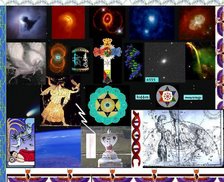
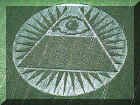




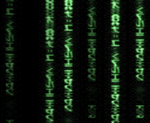



































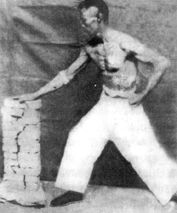























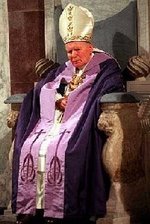








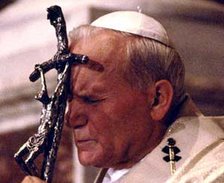



































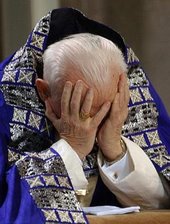







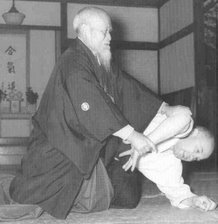

















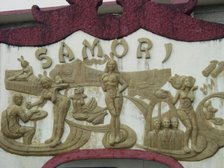






















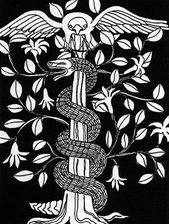








No comments:
Post a Comment